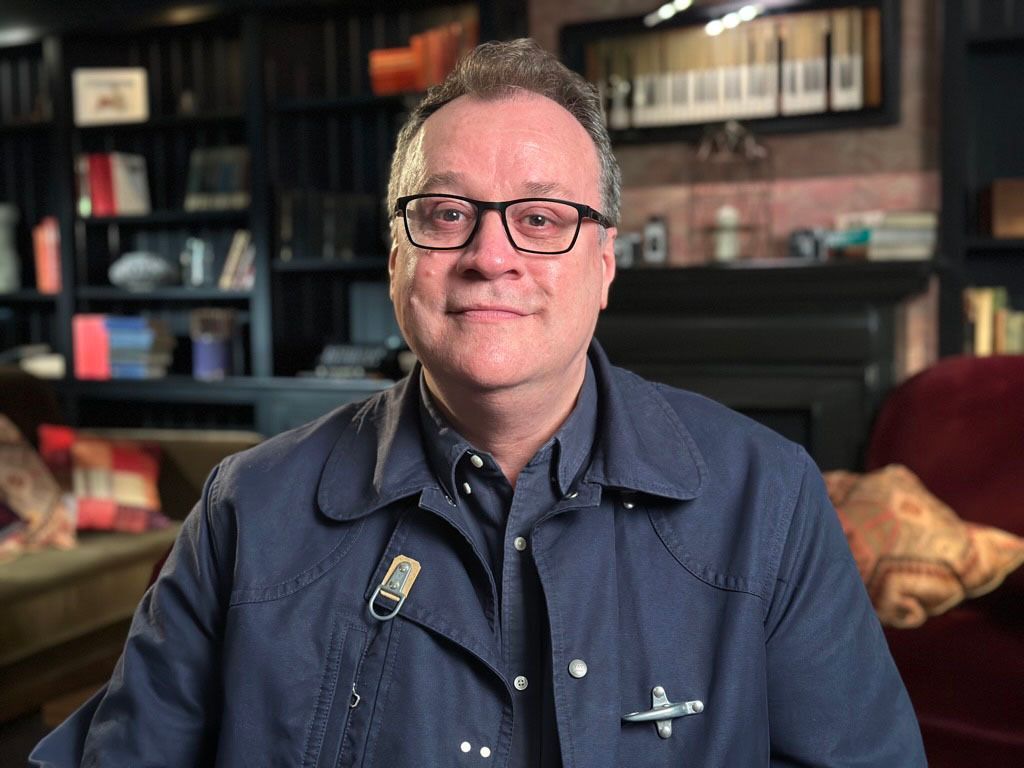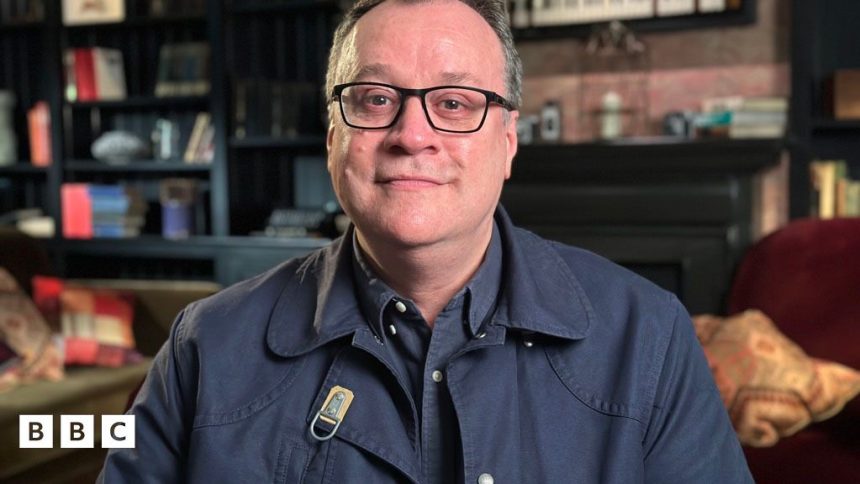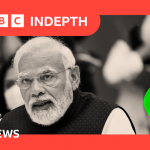Why has Doctor Who always been so LGBT-friendly? Russell T Davies thinks he knows

-
Published
For Doctor Who head writer Russell T Davies, watching the series in the mid-1980s paralleled his feelings about his own sexuality.
“Being gay was ‘the love that dare not speak its name’ and Doctor Who shared that feature as well by that time,” he says. “It was a cheap, old, mad science fiction show. You couldn’t say you fancied anyone, and who couldn’t say that you loved Doctor Who.”
“Before that, when I was a child, everyone loved Doctor Who,” the gay writer and creator of shows including It’s a Sin and Queer as Folk tells the BBC in an interview before the start of the new series. “But then a moment comes in secondary school when boys peel off and start playing football and fancying girls.
“And I was just sitting there quietly, not expressing who I was until I became an adult, still watching Doctor Who.”
Russell is just one of many LGBT people who have been drawn to the show throughout its 60-year-history, from the show’s first-ever director Waris Hussein to the latest incarnation of the Doctor Ncuti Gatwa, who this year topped the Independent’s Pride List of LGBT changemakers.
The show has also long had a large LGBT fanbase, with numerous fan groups and even drag shows celebrating the series.
With its latest episode, however, the show has given LGBT fans something they have never had before: Rogue (played by Jonathan Groff), a figure who companion show Doctor Who: Unleashed called “the Doctor’s new-found love interest.”
Some fans may be surprised by this male love interest for the Doctor, but it is a culmination of a long process for the show…
‘Doctor Who can’t avoid being camp’
Gay Doctor Who fans discuss the camp appeal of the show on Gaytime TV in 1995
On the BBC’s LGBT-focused magazine show Gaytime TV in 1995, a member of LGBT Doctor Who society the Sisterhood of Karn was asked why the show has such a big gay following.
He replies: “It’s very anti-establishment… the programme has never been overtly heterosexual and it’s incredibly camp… all those incredibly vampy outfits.”
These were also elements that chimed with Russell. “Doctor Who was kind of sexless,” he says. “He’s with a beautiful woman all the time and never looks at her sexually. And that’s an interesting little chime with a young, gay boy.”
As for the campness of the show, Russell thinks it came from the show trying to pull off expensive ideas on a small budget without using expensive special effects. “The low budget means they used silver and glitter,” he says. “They turned to someone with a funny wig on their head, pretending to be a Martian. The programme can’t avoid being camp.”
Russell T Davies says the low budget of the show in its first incarnation meant it couldn’t avoid being camp
From the beginning, the team behind Doctor Who included LGBT people, including Waris Hussein, the director of the show’s first ever episode.
“Doctor Who’s first director was a gay Asian man,” Russell says. “I find that to be a tremendous victory.”
Meanwhile, in 1996, before being involved with the TV series, Russell wrote a Doctor Who spin-off novel for adults, called Damaged Goods.
“These books were for adults, and as part of the story of these books, they gave me a six foot blonde sexy male companion,” he says. “And I was like, ‘he’s so going to have gay sex.’ He’s from the far future, so these walls [between sexualities] we put up simply would not exist.”
Russell’s first series of Doctor Who introduced the first out LGBT companion in John Barrowman’s Captain Jack Harkness
‘I learned how to be human from watching Doctor Who’
When Russell took over Doctor Who for the first time in 2005, fans were introduced to the series’ first LGBT character, the pansexual Captain Jack Harkness (played by John Barrowman).
For Reece Connolly, an actor who runs the LGBT Doctor Who-themed Gallifrey Cabaret with drag queen Carrot, this character was a “light bulb moment”.
“When you are watching as a young working class north-easterner who’s never met someone like that in real life, you go: ‘Wow, who is that? That is so cool,’” says Reece.
The introduction of LGBT characters into Doctor Who was opposed by some. “I was at a wedding once,” says Russell, “where a woman objected to that. She had a right old go at me, saying ‘don’t you show my children that, I just won’t have it.’ I turned around and was as rude to her as she was to me.”
Carrot and Reece Connolly’s Gallifrey Cabaret is ‘a night of cosmic drag and cabaret’
For a generation of LGBT fans growing up with modern Doctor Who, characters like the pansexual Captain Jack and lesbian couple Jenny (Catrin Stewart) and Vastra (Neve McIntosh) were unlike anything else on TV.
“In the early noughties, culture was barren for young, queer kids,” says Reece. “So when Doctor Who was brought back by someone like Russell T Davies, a proud gay man who put that front and centre unashamedly, we gripped it with both hands.”
A version of Vastra is one of Carrot’s favourite acts from their cabaret sets, which they have performed in London, Manchester and Cardiff. “A lovely lesbian lizard lady doing burlesque to Ariana Grande. What’s not to love?” the drag performer says.
For Carrot, the impact of Doctor Who on their life was profound. “I feel like I learned how to be human from watching that show.”
Characters like romantic partners Vastra and Jenny have increased the show’s LGBT representation
In creating an LGBT-friendly space like the Gallifrey Cabaret, Reece is reflecting one of their favourite parts of Doctor Who. “Throughout the Doctor’s life, they collect friends and special people, comrades and companions, and they hold them close. We queer people can really relate to that idea of chosen family.”
For Russell, Doctor Who is a show that matches the things he most loves about the LGBT community.
“Doctor Who is a very, very clever show that doesn’t rely on guns and lasers, it relies on wit and style. It is a show about an outsider who visits communities where sometimes they are treated harshly and sometimes welcomed like an old friend.
“Other sci-fi is catching up with non-binary characters and queer relationships, but I like to think Doctor Who’s been there earlier, better, and always will be there.”
Doctor Who airs on Saturdays on BBC One and is streaming now on BBC iPlayer.
Related Topics
Read more
-
-
Published10 May
-
-
-
Published12 April
-






